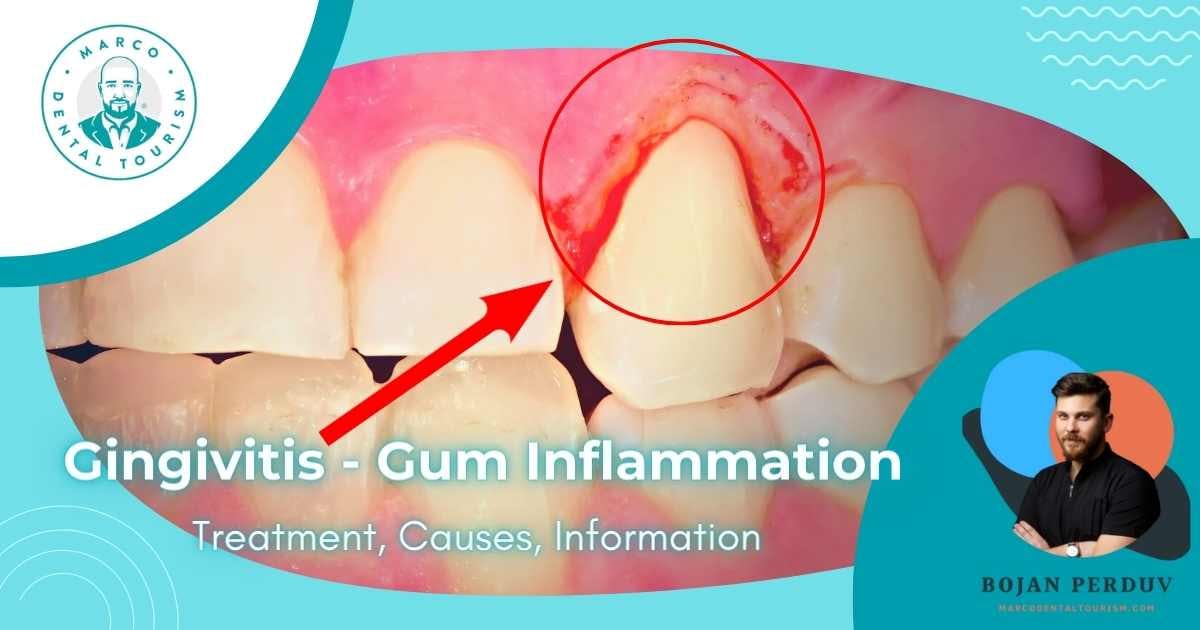Inflammation of the gums: Why does it occur and how is it treated?

Introduction
Have your gums suddenly become red, swollen and sensitive to the touch? If the answer is positive, you may have an early stage of a very common dental problem - gingivitis. But what exactly is gingivitis and how does it occur? In this blog, we explore everything about gingivitis, from its causes and symptoms to treatment methods and the best prevention. We also discover how stress and teeth are connected, as well as how to maintain healthy teeth and gums by reducing the amount of stress.
What is gingivitis and what causes it?

Gingivitis is a type of gum disease that causes inflammation and bleeding gums. It is usually caused by irregular oral hygiene, which leads to the accumulation of plaque and bacteria on the teeth and gums. Other factors that can contribute to gingivitis include hormonal changes, certain medications, and smoking.
What are the symptoms of gum inflammation and how is it diagnosed?

The most common symptoms of gum disease are red, swollen and bleeding gums. Gum disease can also be recognized by bad breath, loose teeth, receding gums and changes in bite. Gingivitis is diagnosed during regular dental examinations, after which a detailed treatment plan is determined.
How does gum inflammation affect oral health?

Gingivitis can lead to bleeding and receding gums, as well as bad breath. If left untreated, gum inflammation can progress to periodontitis, causing tooth loss and other health problems. Maintaining good oral hygiene and regular check-ups can prevent and cure gingivitis.
How to prevent gum inflammation?

Good oral hygiene, a healthy diet and regular dental checkups are key factors in preventing gingivitis. For the most effective prevention, rinse your mouth with a solution of baking soda and water, use an interdental brush and fluoride toothpaste.
How can gum inflammation be prevented through oral hygiene?

Gingivitis can be prevented by brushing the teeth twice a day, using floss for inaccessible parts of the mouth and teeth, and using an anti-tartar toothpaste. Regular dental checkups can also detect and treat early signs of inflammation before they progress to more serious forms like periodontitis.
What is the best anti-tartar toothpaste?

Anti-tartar toothpaste with fluoride is the best choice against tartar. For people with sensitive teeth, a toothpaste specially formulated for sensitive teeth and gums that does not cause discomfort and irritation is recommended. Consult your dentist about the choice of paste for your needs.
How often should you visit the dentist to prevent inflammation?
A visit to the dentist is recommended at least twice a year. Regular cleanings and dental checkups can detect and treat gingivitis before it develops into more serious gum disease. Maintaining oral hygiene at home is also essential for healthy teeth and gums.
How is tooth and gum infection diagnosed and treated?

Gingivitis is diagnosed with a regular examination during which the dentist will look for signs of red, swollen and bleeding gums. The treatment includes professional cleaning to remove plaque and tartar, after which daily maintenance of oral hygiene at home is recommended.
What are the methods of treating gingivitis?

Treatment methods for gingivitis include professional teeth cleaning, improved oral hygiene, and antibiotics to reduce inflammation. In severe cases, surgery may be necessary to repair damaged gum tissue. Dedicated oral care at home can prevent the recurrence of gingivitis.
How can re-inflammation of the gums be prevented after treatment?
In order to prevent re-inflammation of the gums, it is important to maintain good oral hygiene. Brush your teeth at least twice a day, floss and rinse with water after meals. Avoid using tobacco and eat a balanced diet. Go for regular checkups to monitor your oral health.
What is the best natural remedy for gum inflammation?

One of the best natural remedies for gingivitis is to rinse your mouth with a salt water solution. Mix 1/2 teaspoon of salt in a cup of warm water and swish around your mouth for 30 seconds, then spit out. This can help reduce swelling and kill harmful bacteria.
We suggest a few more all-natural ingredients to reduce gum inflammation:
Sage: Due to its anti-inflammatory properties, sage helps reduce inflammation and bacterial growth.
Tea tree oil: Tea tree has antimicrobial properties that make it a natural fighter against bacteria and an antibiotic.
St. John's Wort: St. John's wort's soothing effect reduces discomfort and inflammation and helps relieve sore and swollen gums.

Stress can cause teeth grinding and clenching leading to tooth damage and jaw pain. Also, stress weakens the immune system, making the gums more susceptible to infections and diseases. Stress management and relaxation techniques can help prevent these dental problems.
Can gingivitis be caused by stress?
Stress indirectly causes the development of gingivitis by weakening the immune system, making it difficult for the body to fight infection. In addition, constant exposure to stress can cause people to neglect their oral hygiene habits, which can contribute to an increased risk of many dental diseases.
Can reducing stress help prevent gingivitis?
Yes, reducing stress helps prevent gingivitis. Chronic stress weakens the immune system, making it difficult for the body to fight infections such as gingivitis. Practicing stress-reducing activities such as walking or exercise can improve immunity and overall oral health.
Conclusion

To conclude, gingivitis is a common dental problem that can be prevented and treated with good oral hygiene habits and regular dental checkups. It is essential to treat gingivitis immediately to prevent it from progressing into more serious gum disease or tooth loss.

















Share your opinion!
What do you think about this topic?
Comments (0)